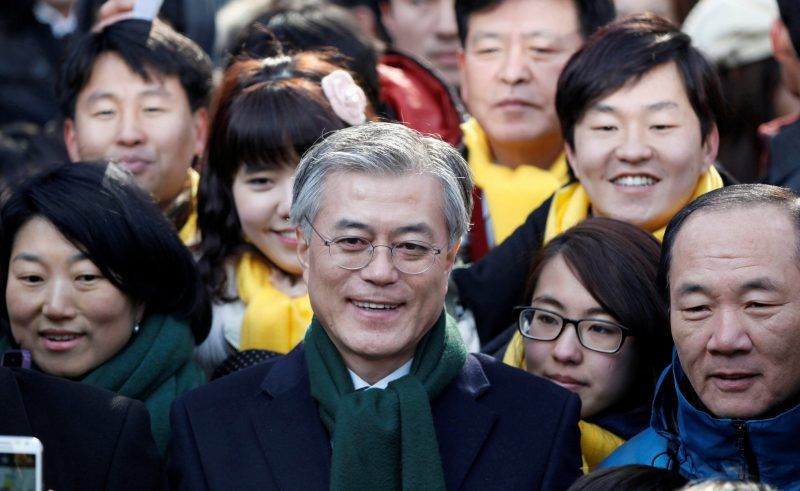
As President Trump struggles to devise a North Korea strategy, one country’s voice has been largely missing from public debate: South Korea’s. Yet South Koreans would bear the brunt of the retaliation should Mr. Trump opt for a “pre-emptive” strike against the North Korean regime. Long-term peace on the Korean Peninsula is impossible without Seoul’s input.
South Korea’s lack of influence with the Trump administration was evident during Secretary of State Rex Tillerson’s recent visit to Asia. He held considerably shorter meetings with the South Koreans than with officials in Tokyo, and he did not even dine with his counterparts in Seoul. The South Korean side claimed Mr. Tillerson was tired (giving rise to “stamina” jokes on Twitter). The secretary fired back that his South Korean hosts had never sent a dinner invitation.
South Koreans are partly to blame for being marginalized. The country has been preoccupied since last year by a political scandal that embroiled President Park Geun-hye and ultimately led to her removal from office on March 10. The place-holder government of Park appointees maintains her hard-line posture toward North Korea but without legitimacy in the eyes of the public.
South Korea’s political vacuum will come to an end when the country votes on May 9 for a new leader, who will take office immediately. The election will have far-reaching implications for the Korean Peninsula — and for Mr. Trump’s North Korea policy.
The liberal opposition is widely expected to win, with the Democratic Party standard-bearer, Moon Jae-in, maintaining a comfortable lead in the polls. The conservatives are in disarray, having split into pro-Park and anti-Park parties; they have yet to find a presidential candidate who polls over 10 percent. South Korean elections are notoriously unpredictable, but public disgust with the impeached president is casting a pall over the conservative camp.
North Korea policy is one of the sharpest points of divergence between liberals and conservatives in the South. The hard-line conservative approach of all sticks and no carrots was unpopular by the time Ms. Park took office in 2013. Early on, she appeared to be looking for middle ground: She advocated building trust with Pyongyang and did not make denuclearization a precondition for inter-Korean dialogue. But as time passed, it became clear that Ms. Park’s interest in improving relations was all talk. After North Korea’s fourth nuclear test in January 2016, she abruptly shifted back to harsh rhetoric and hard-line policies, most notably by shutting down the joint North-South industrial park at Kaesong.
Mr. Moon wants to bring back dialogue and negotiation as means to lower tensions and increase security on both sides of the demilitarized zone. He advocates expanding cultural exchanges and humanitarian assistance to improve inter-Korean relations, alleviate suffering among North Korean people and encourage the North’s opening-up. Perhaps most important, Mr. Moon embraces economic cooperation, trade and investment to help Pyongyang shift from its focus on security to building its economy.
There is good reason to think that this more open approach to the North is the better way to handle its supreme leader, Kim Jong-un.
The current strategy, after all, is a dead-end. Missile defense, military exercises and economic sanctions only feed the insatiable security dilemma. Even the acclaimed Terminal High Altitude Area Defense system, deployed in the South by the United States, does nothing to protect Seoul from an attack. And each marginal improvement in the South’s defense prompts the North to develop new asymmetrical threats and can have costly side effects. For example, Seoul’s relations with Beijing have tanked over the Thaad deployment, which China sees as a threat to its security.
But the liberal approach takes advantage of Mr. Kim’s ambitions. As soon as he took power in 2012, Mr. Kim promised his people that they would never again have to “tighten their belts,” and he put economic progress at the center of his strategy. Half of that strategy, known in Korean as “byungjin,” or “simultaneous progress,” refers to improving the nuclear deterrent, which gets all the headlines. Yet nuclear deterrence only provides the security guarantee on which Mr. Kim can turn to the more ambitious half of byungjin: economic development.
Mr. Kim has made policy decisions — introducing agricultural and enterprise reforms, appointing technocrats, opening new special economic zones and leaving the markets alone — that demonstrate that his economic ambitions are more than sloganeering. In a major speech at the beginning of the year, Mr. Kim also stressed he was ready to “join hands” to work with anyone in the South who wants to improve inter-Korean relations.
This opening for the next administration in Seoul to work with Mr. Kim is also an opportunity for Mr. Trump. The smart play for Mr. Trump would be to return to those five wise words he said about Mr. Kim on the campaign trail: “I would speak to him.” The United States should swiftly negotiate a bilateral deal that freezes Mr. Kim’s nuclear and missile program.
South Koreans would be relieved to see Mr. Trump pursuing prudent diplomacy instead of reckless warmongering, and a “cap and freeze” deal would give a new government in Seoul a better foundation for opening its broader effort to help Mr. Kim lead his country toward regional integration and economic growth.
A new South Korean president would prefer to start opening up toward the North with a United States-North Korea nuclear deal in place. But barring that, the next leader in Seoul should move forward with improving inter-Korean relations, and hope that Washington will eventually see the wisdom in a more open approach.
John Delury is an associate professor of Chinese studies at Yonsei University Graduate School of International Studies.
